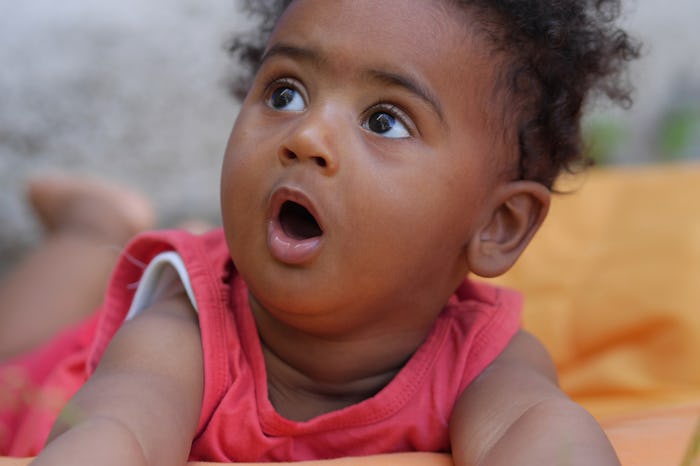It's really easy to go on, at length, about a child's physical appearance. I mean, let's keep it real for a second here: kids are adorable. For a while, when they're babies and don't seem to have personalities or abilities beyond crying for no reason and pooping themselves, adorable is pretty much all they are are far as the casual observer is concerned. Still, from a very young age they're absorbing everything we say into their sponge-like brains. Not only does focusing on appearance establish crappy priorities, but sometimes things you say about a kid's appearance can be shaming. Unfortunately, body shaming has become so pervasive in our culture that we don't always recognize it or, even if we kind of do, we say it anyway thinking we're being helpful.
Sometimes body-shaming sentiments are direct and just below the surface. Other times, things get a little more insidious, like when we praise children at the expense of other people whom we have (again, subconsciously or not) deemed as less attractive or less worthy. We define their beauty or goodness by what they aren't. This is still shaming, and it's still not right. In fact, it's bad for everyone involved, including the child who we've complimented and who has now internalized the idea that there's a "right" and "wrong" way to be and takes that back to their school, neighborhood, playground, park and family.
So, I've included rounded up some common refrains about a child's appearance, along with their real-talk translations, in an effort to combat the inconspicuous shaming we may or may not be aware we're doing to kids. Please, avoid these and statements like them whenever possible.
"She'll Be Beautiful Once She Loses That Baby Fat"
Translation: She's not beautiful now, but you think that she could be if she were different. That's, you know, never something anyone should say about anyone. I have to imagine people know they're saying something hurtful, even before it escapes their lips, but they think they're being slick enough that you didn't notice. Still, just in case you think you're actually being unequivocally nice with this, you aren't. Remember, if you have to qualify an appearance-directed compliment, it's never really a compliment.
"He Certainly Doesn't Care What People Think About Him"
Translation: This kid is a hot mess and doesn't know enough to try and get it together. I find this and sentiments like it are usually more often directed at the parents as a not-so-subtle hint that they should be more focused on their child's hair, clothing, cleanliness, or overall appearance.
"She's A Tomboy"
Translation: There's a particular way girls are supposed to behave and she is not that. Indicating that there's only one type of way to be a girl is myopic and pretty nasty. Let a kid figure out who they are before you inform them of what they are (and, pointedly, what they aren't).
"Don't Worry, As They Get Older Their Height/Weight Will Average Out"
Translation: Your kid is fat and/or an awkward looking giant. This sort of statement indicates that parents are worried about their child's appearance and/or future appearance in the first place. Like they lie awake at night, unable to sleep, biting their nails at the idea that their daughter is going to be a Brienne of Tarth-style Amazon woman because her height and weight are currently at the 90th percentile. (Sidebar: I would be so excited if my daughter grows up to be a Brienne of Tarth-style Amazon woman.)
"That Outfit Is So Flattering On Them"
Translation: They don't look this good most of the time. What, pray tell, about a child's appearance needs to be flattered? Seriously, why are we praising a kid for looking good. Nobody should be overly preoccupied with that crap, least of all children.
"You're So Brave To Let Them Wear That"
Translation: People are judging you and you should both be embarrassed. Bravery can take many forms, but I can't think of too many cases where a child dressing like a kid (even if that means wearing something completely bizarre, like rain boots and a sparkly pink cape and a Spider-Man mask to the grocery store) is "brave." They're kids. Kids don't care. They're not brave, they're just blissfully ignorant of the fact that people would give them crap for their decisions.
"Here, You'll Look Much Better In This Outfit!"
Translation: You look like crap in that outfit. Again, a kid's appearance isn't something we should be emphasizing as all that important. Let them wear what makes them happy and let's all move on with our lives, m'kay?
"You're Eating Fruit? Good For You! You'll Stay Nice And Skinny!"
Translation: Fat people are bad. This is a message that children will, unfortunately, get over and over again (consciously and unconsciously) from media, friends, and family for the rest of their lives. Thinness has become a social sign of moral superiority. Fatness has become a social sign of moral ineptitude, lack of self-control, and laziness. Foods that make a person gain weight when eaten in excess are "bad." So, praising someone for eating healthy foods so they can "stay skinny" (or assuming that they are making that choice because they want to "stay skinny") is just sending the message that they would not be worthy of praise if they were fat.
Compare Them To Other Kids
For example, "You're beautiful like your sister," or, "You're not tall like your cousins." Children shouldn't be prompted to compare themselves to others because, even when it's well-intentioned, that's when they begin to think about the ways they fall short. It can instill in them the idea that they are, in fact, competing with other children (and, eventually, other people) when it comes to their physical appearance. They can begin to value themselves only insofar as they are like or unlike other people. A child's body confidence should be built on the idea that they are their own person and they are enough.
